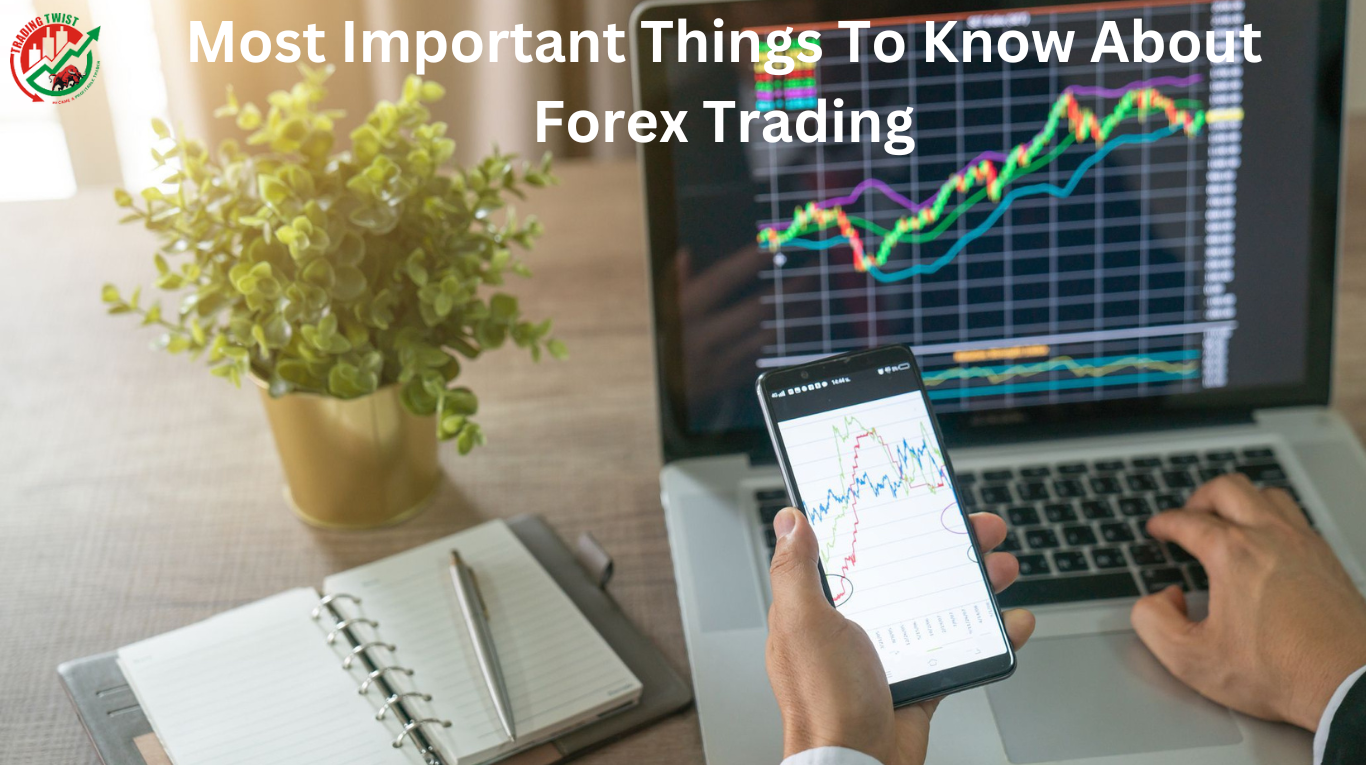
In forex trading, we trade on foreign exchange or currency pairs. Before starting Forex trading you know about the ethics of the Forex Market. So, Here we discuss the most important things to know about forex trading before starting trades.
Most Important Things To Know About Forex Trading
1. What is Forex trading and what are the benefits of this type of investment?
Forex trading, also known as foreign exchange trading or currency trading, is the act of buying and selling different currencies with the goal of making a profit. The Forex market is the largest financial market in the world, with a daily trading volume of over $5 trillion.
There are several benefits to Forex trading:
- Liquidity: The Forex market is highly liquid, meaning that it is easy to buy and sell currencies at any time. This makes it an attractive option for traders who need to move in and out of positions quickly.
- Volatility: The Forex market is known for its high volatility, which can lead to large price movements in a short amount of time. This can create opportunities for traders to make profits from both rising and falling prices.
- Leverage: Forex traders can use leverage to increase their buying power, which allows them to trade larger positions with smaller investments. However, it is important to be aware that leverage can also increase the risk of losses.
- Accessibility: The Forex market is open 24 hours a day, five days a week, which means that traders can buy and sell currencies at any time. This allows traders to trade around the clock and take advantage of trading opportunities as they arise.
- Low barriers to entry: Forex trading is relatively easy to get started in, with many online brokers offering access to the market with low minimum deposits and flexible trade sizes.
- Diversification: Forex trading can be a way to diversify an investment portfolio, as it is not correlated with other asset classes such as stocks and bonds.
It is necessary to keep in mind that Forex trading involves risk and is not appropriate for everyone. It is critical for traders to comprehend the risks and create a sound trading plan in order to effectively manage such risks.
2. What are the different types of Forex trading and which is the best for you?
There are several different types of Forex trading, each of which has its own unique characteristics and suitability for different types of traders.
Some common types of Forex trading include:
- Day trading: Day trading involves buying and selling currencies within the same trading day. Day traders aim to take advantage of short-term price movements and close their positions before the end of the trading day. Day trading requires a high level of discipline, as well as the ability to make quick decisions and react to changing market conditions.
- Swing trading: Swing trading involves holding positions for a few days to a few weeks, and is suitable for traders who are able to monitor the market on a more frequent basis. Swing traders aim to take advantage of longer-term price trends and often use technical analysis to identify potential trade opportunities.
- Position trading: Position trading involves holding positions for a longer period of time, often several months or even years. Position traders aim to take advantage of longer-term trends and are willing to endure short-term price fluctuations in order to achieve their objectives.
- Scalping: Scalping involves taking advantage of very small price movements, often holding positions for just a few seconds or minutes. Scalping requires a high level of skill and attention to detail, as well as the ability to make rapid decisions and execute trades quickly.
Which type of Forex trading is best for you will depend on your personal circumstances, such as your level of experience, risk tolerance, and time availability. It is important to carefully consider your goals and trading style before deciding which type of Forex trading is most suitable for you.
3. What are the different types of Forex brokers and which one is the best for you?
There are several different types of Forex brokers, each of which offers different services and features. Some common types of Forex brokers include:
- Market makers: Market makers act as the counterparty to trades and make a profit by charging a spread (the difference between the bid and ask price). Market makers may also offer additional services such as charting tools and educational materials.
- ECN (Electronic Communication Network) brokers: ECN brokers offer direct access to the interbank market and charge a commission for their services. ECN brokers may offer tighter spreads and faster trade execution, but may also require higher minimum deposits.
- STP (Straight Through Processing) brokers: STP brokers route trades through to a liquidity provider and may offer a mix of both ECN and market maker services. STP brokers may offer a combination of low spreads and low commissions.
- Dealing desk brokers: Dealing desk brokers act as market makers and may also offer additional services such as charting tools and educational materials.
Your specific circumstances, such as your level of experience, risk tolerance, and trading goals, will determine which type of Forex broker is appropriate for you. To select a broker that matches your demands, it is crucial to conduct thorough research and comparisons of various brokers. In order to protect your money, it’s also critical to be informed of the hazards involved in Forex trading and to select a trustworthy, licensed broker.
4. What are the different types of Forex trading strategies and which one is the best for you?
There are many different types of Forex trading strategies, and the best one for you will depend on your personal circumstances and goals.
Some common types of Forex trading strategies include:
- Technical analysis: involves using past price data and chart patterns to identify potential trade opportunities. Technical traders may use a variety of indicators, such as moving averages, oscillators, and trend lines, to help identify trends and potential entry and exit points.
- Fundamental analysis: Fundamental analysis involves analyzing economic and political events that may impact the value of a currency. Fundamental traders may consider factors such as interest rates, employment data, and political stability when making trade decisions.
- Trend following: Trend following involves identifying and following long-term trends in the market. Trend followers may use various technical indicators and chart patterns to identify trends and enter trades in the direction of the trend.
- Range trading: Range trading involves identifying a range in which a currency pair is likely to trade, buying at the lower end of the range and selling at the upper end. Range traders may use support and resistance levels, as well as chart patterns, to identify range-bound markets.
- Breakout trading: Breakout trading involves identifying key levels of support and resistance and waiting for the price to break through these levels before entering a trade. Breakout traders may use technical indicators such as Bollinger Bands to identify potential breakout points.
5. What are the risks and how can you reduce them?
Forex trading carries a number of risks, including market risk, leverage risk, and liquidity risk. It is important for traders to understand these risks and to develop a solid risk management plan to manage them effectively.
- Market risk: Market risk refers to the risk of loss due to changes in the value of currencies. Market risk can be affected by a number of factors, such as economic and political events, natural disasters, and changes in interest rates.
- Leverage risk: Leverage allows traders to increase their buying power and trade larger positions with a smaller investment. However, leverage also increases the risk of losses, as traders may be required to pay back more than they originally invested if their trades go against them.
- Liquidity risk: Liquidity risk refers to the risk of not being able to buy or sell a currency when needed due to a lack of buyers or sellers. This can occur in thin markets or during times of market volatility.
To reduce the risks in Forex trading, traders can use a number of risk management techniques, such as setting stop-loss orders to limit potential losses, using appropriate leverage levels, and diversifying their portfolios. It is also important for traders to have a solid understanding of the market and to conduct thorough research before making trades.
The Best Forex trading strategy
Which type of Forex trading strategy is best for you will depend on your personal circumstances, such as your level of experience, risk tolerance, and time availability. It is important to carefully consider your goals and trading style before deciding which strategy is most suitable for you. It is also important to be aware of the risks associated with Forex trading and to develop a solid risk management plan to manage those risks effectively
If you want to start Forex trading, few important things to know about forex trading
- Choose a reputable and regulated Forex broker: It is important to choose a Forex broker that is regulated by a reputable organization such as the Financial Conduct Authority (FCA) or the National Futures Association (NFA). This will ensure the safety of your funds and protect you from fraud.
- Develop a trading plan: A trading plan should outline your trading goals, risk management strategies, and the tools and techniques you will use to analyze the market. Having a solid trading plan can help you stay disciplined and make informed decisions.
- Educate yourself: Forex trading involves a learning curve, and it is important to educate yourself on the market and trading techniques. This can involve reading books, taking online courses, or participating in a mentor program.
- Start small: It is generally recommended to start small and gradually increase your position size as you gain experience and become more confident in your trading skills.
- Use risk management techniques: It is important to use risk management techniques, such as setting stop-loss orders, to limit potential losses. This can help protect your capital and ensure that you are able to survive the inevitable losing trades that all traders experience.
- Be patient and disciplined: Forex trading requires patience and discipline. It is important to stick to your trading plan and not let emotions cloud your judgment.
Some Tips Before Starting Forex Trading with your Real capital
- Forex trading involves buying and selling currencies.
- The Forex market is decentralized, meaning it is not controlled by a central authority.
- The Forex market is open 24 hours a day, five days a week, which means that traders can buy and sell currencies at any time.
- The value of a currency is determined by supply and demand.
- Forex traders can make money by buying low and selling high, or by selling high and buying low.
- Forex traders can use leverage to increase their buying power, but this also increases the risk of losses.
- It is important for Forex traders to keep an eye on economic and political events that can impact the value of currencies.
- Forex traders should use risk management techniques, such as setting stop-loss orders, to limit potential losses.
- It is important for Forex traders to have a solid understanding of technical analysis and fundamental analysis.
- Forex traders should carefully consider the costs of trading, including spreads, commissions, and overnight financing charges.
Conclusion
It is also important to be aware of the risks associated with Forex trading and to only invest what you can afford to lose. Forex trading is not suitable for everyone and carries the risk of significant losses.








